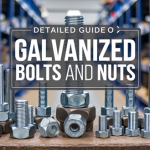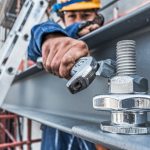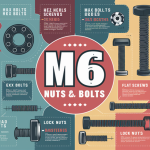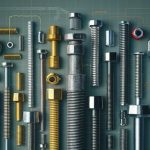Introduction

When it comes to building or mending a structure, picking the appropriate fastener grade might be puzzling. Due to its uncertain strength and solidity, high-tensile fasteners are a critical component in a far-reaching variety of construction projects. However, since there are several alternatives accessible, selecting the correct high-tensile fastener and grade is a challenging task. This is particularly true for those who have a small amount of experience in the sector.
Picking the appropriate high tensile fastener grade is vital for safeguarding the reliability and safety of many structures and applications. Here’s a guide to help you get the right one.
Different Grades of High Tensile Bolts
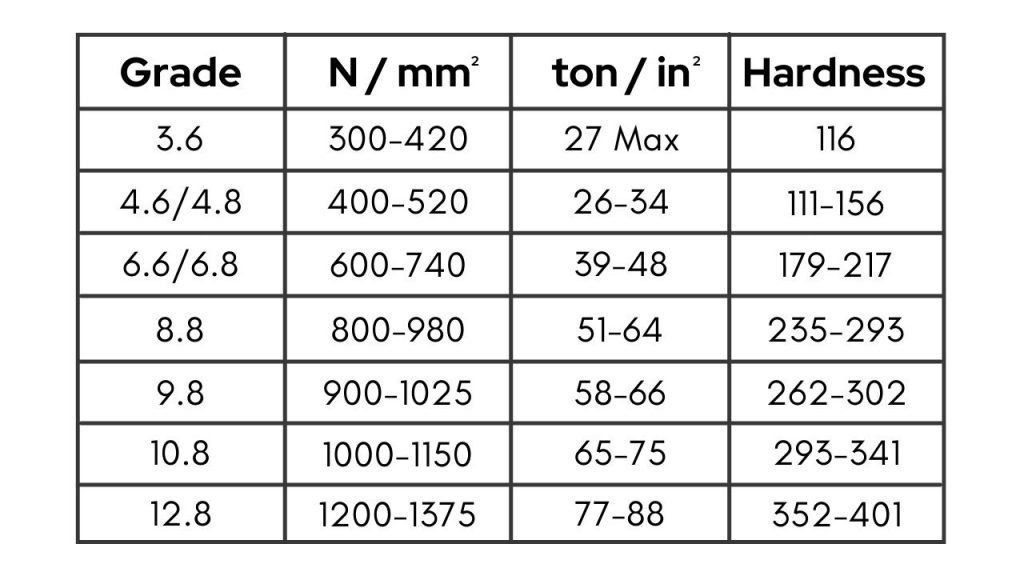
Grade 8.8 Bolts
This is a bolt which is high tensile and it is made from steel. These bolts are coated with steel coatings. Bolts of this grade are usually structural graded bolts which are primarily used in the actual world. Grade 8.8 bolts are affixed with the help of a torque wrench.
Grade 10.9 Bolts
These graded bolts are popularly known as car bolts which are mainly utilized in the automotive sector. These are high tensiles whose strengths are 1040 MPa. These graded bolts are made from boron or carbon steel.
Grade 12.9 Bolts
You can notice these high bolt strengths in manufacturing and construction sites. To join the engines, these graded bolts can also be found in the automotive sector. To join a medium to heavy range of parts, these graded bolts are used.
Grade 14.9 Bolts
These graded bolts are known to last long. Moreover, these graded bolts are utilized in affixing structural joints of large size. These graded bolts have a high tensile strength which is mainly 1400 MPa. These graded bolts are seen in construction sites.
Grade 2 Bolts
It is important to note that an average amount of carbon steel is used in the grade 2 bolts. These bolts are highly used in the joints and applications that are not critical.
Grade 5 Bolts
It is imperative to note that grade 5 bolts comprise carbon steel of medium amounts that is treated in heat and is used in enhancing strength. These bolts are referred to as fasteners which can bear medium strength. These graded fasteners are used in construction and automotive establishments.
Grade 8 Bolts
With the help of carbon alloy in average amounts, grade 8 bolts are used. These bolts are treated with heat and they are made from alloys of a high strength. Grade 8 bolts can bear extreme stress and they last for a long time.
Tips on selecting the correct high-tensile fastener for your project
Determine the application:
When you go to select the High Tensile Fastener Grade for your project, it’s important to consider many aspects, this is further to ensure that your chosen fastener meets the specific demands of your app. The slightest mistake can lead to reduced power, augmented risk of failure, or even project delays.
- Structural steel construction: In structural steel construction, fasteners are exposed to exceptionally high loads and stresses, this makes it vital to choose the right grade for the completion of the structure. ASTM A325 and A490 are quite commonly used fastener grades in buildings made of steel.
- Heavy manufacturing: By recognizing the accurate fastener grade, manufacturers can be guaranteed that their equipment can withstand the severities of heavy use and harsh atmospheres. It must also offer a safer and more consistent operation for end-users.
- Automotive industry: Here the fastener grades are considered into 3 major levels: SAE Grade 5, SAE Grade 8, and SAE Grade 10. SAE Grade 5, the quite common, offers a reasonable level of strength.
- Aerospace engineering: In the high-stakes realm of aerospace engineering, the selection of fasteners is critical. For instance, High Tensile Fastener Grades such as NAS or MS series, are made to withstand extreme temperatures and tremors.
Read Also: Demystifying High Tensile Fasteners for Reliable Construction
Consider the material:
Material matters when choosing fasteners. Here’s a breakdown of common materials and their compatible fasteners:
- Carbon Steel: Grade 8.8 or 10.9 fasteners (ISO 898-1) or ASTM A325 or A490 (USA)
- Stainless Steel: ( A2-70, A4-80) with similar rust negativity
- Aluminum: (7076-T6, 6661-T6) with well-suited strength and zero weathering.
- Titanium: (Ti-6Al-4V) having higher strength-to-weight ratios.
- Copper: Copper-alloy fasteners ( Cu-Zn, Cu-Sn) with electrical conductivity
- Plastics: Particular plastic fasteners (e.g., nylon, polypropylene) or metal fasteners with aligned coatings
- Wood: Wood screws or nails with the best material and finish (galvanized, stainless steel)
- Concrete: Anchors specifically made for concrete (extension anchors, concrete screws)
Considering the Load and Load Type:
It is vital to know the load and its type to guarantee that your fastener can bear the stresses and strains it will come across. It needs to understand the force or pressure applied to the fastener. Once you know the type of load your fastener will then be dependent on determining the suitable grade and type of fastener to use.
Select a Reliable Manufacturer of Fasteners:
The manufacturer is yet another crucial consideration when selecting the High Tensile Fasteners. When choosing a High Tensile Fastener Manufacturer to fit your requirements, understand its reputation, the quality of products it sells, and its special fastening solutions.
Consult industry standards and regulations:
Business standards and guidelines, such as those established by the International Organization for Standardization (ISO), the American Society for Testing and Materials (ASTM), and the Society of Automotive Engineers (SAE), offer the requirement for fastener grades used in various applications.
Ensuring the Right Fit:
To confirm the correct fit, it’s important to measure the material you’re functioning with. To determine the precise diameter, length, and thread type you must take extra care. This may involve using specialized tools, like calipers or micrometers, to get an exact measurement.
Choose the correct head fastener:
A fastener can have a screw head, socket head, hex head, or alternative style head. The design of the fastener head is significant for supporting the kind of spin the fastener must survive. Proper selection of the head will simplify the assemblage and compression of the fastener to the suitable torque.
Bottom Line
From this comprehensive guide, selecting the right high-tensile fastener is a crucial step. It will further allow you to ensure the success of your project. With the right High Tensile Fastener Grade, you can be confident that your structure will withstand the test of time that comes its way. Besides industry standards and regulations, Remember to get in touch with the finest High Tensile Fasteners Manufacturers India to ensure the selection for your specific application.
FAQs:
1. What Is the Aim of Various Grades?
Fastener grades have strengths that enable your project to withstand the forces applied, protecting weaklings from being broken under pressure! Choosing an ideal fastener grade ensures it can withstand pressure without cracking under strain!
2. Can I always choose the strongest grade?
No! Avoid overkill by selecting a grade whose strength best matches that of your project like buying the ideal tool!
3. What happens if I use the incorrect grade?
A weak grade could shatter under pressure and compromise your creation’s safety. On the other hand, grades that are too strong might add bulk without the necessary purpose.
4. How Can I Select High Tensile Fastener Grade?
Think carefully about your project forces, materials used, and temperature extremes. Before selecting an appropriate grade, consult experts like engineers or hardware stores.
5. Does the tensile Fastener grade have any interesting facts?
Absolutely! Certain grades can withstand extraordinary amounts of weight. Recycling them also contributes to saving the environment, as they are eco-friendly!
6. Which is stronger 10.9 or 12.9 steel?
12.9 grade steel’s tensile strength 120 percent higher than 10.9 grade steel’s—is what matters here.
Read Also:

